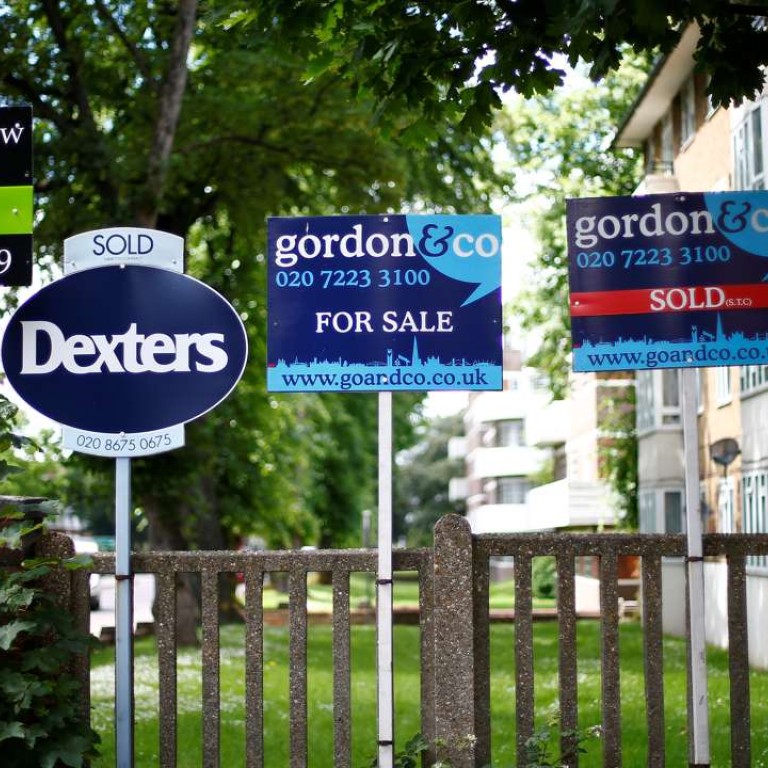
Wealthy mainland Chinese eye bargain homes in UK as Brexit delivers ‘10 per cent discount’
While some investors are keen to buy at lower prices brought about by a weaker pound, experts warn that market uncertainties increase short term risk
Undeterred by the potentially grim economic outlook after Britain’s decision to leave the EU, some wealthy mainland Chinese have started eyeing bargains in the UK housing market, but experts warn that those chasing investment returns had better keep their buying plans on hold until uncertainties are resolved.
With the pound falling more than 10 per cent to its lowest in three decades over the stunning Brexit referendum fallout last week, Sunny Chen, who currently studies in Cambridge, told the Post her parents were for the first time considering purchasing a house in the eastern English county town.
“It feels like we can now buy the same house with a 10 per cent discount, which is quite exciting,” the Guangdong native said. “We are seeing if there is any good deal close to my university so we can buy it and I don’t have to rent a flat anymore.”
Chen’s family was among a number of high net worth Chinese individuals looking to go bargain hunting in Britain’s housing market amid the global market turmoil brought about by Brexit, although more buyers are believed to be sitting on the sidelines as they worry over escalating political and economic uncertainties.
“Over the last a few days the number of inquiries we have received from Chinese clients surged by almost half,” said Shanghai-based Gabriel Shen, who heads the UK operation of Homelink, one of the biggest real estate agencies in China.

According to a pre-Brexit poll of 411 Chinese professionals and investors conducted by Shanghai-based overseas property investment portal Juwai, 46 per cent of respondents believed there would be more demand for UK properties in the event of a Brexit, compared with 25 per cent holding the opposite view.
“Today [we] have seen some Chinese buyers make inquiries about new London projects, in the hopes that they can pick up bargains on off-the-plan units that local private buyers have abandoned back to the developer because of Brexit fears,” said Bernie Morris, president of Juwai’s Britain, Europe and Middle East businesses.
“Some may take advantage of a much cheaper pound to say they may speed up their investment decision,” Knight Frank group chairman Alistair Elliott said. “I wouldn’t be surprised if we see a bit more activity over the next few weeks in residential and commercial markets.”
They suddenly became interested after the sinking pound made global headlines, and Chinese investors have a tradition of going ‘bottom-fishing’
However, experts say that although a window of opportunity has opened in the short term for Chinese investors to accumulate some high-quality properties as the pound softens to bottom levels, it would be wiser for them to wait-and-see until the dusts settles.
“I would suggest to my clients who want to buy a home purely for investment returns to hold off on their plans as everything remains unclear at this point in time,” said Peter Liu, a London-based immigration lawyer with more than 10 years experience serving high net worth clients from China.
“They may need to wait one to two years as it is hard to predict where Britain’s future is headed under the leadership of a new prime minister.”
Homelink’s Shen said he expected overall mainland investor sentiment in British properties to remain cautious until the end of the year, project7ing total transactions to shrink by 30 per cent from the same period last year.
According to the Association of Estate Agents in Britain, the decision to leave the EU will lead to a significant slowdown in property price growth in London in the coming three years, with an average home in the British capital costing £7,500 less than if Britain had voted to remain.

“It was absolutely depressing news as it made the value of my property shrink by 10 per cent overnight. I might have to cut my rent to lure tenants when the local market starts to take the hit [from the Brexit vote],” he said.
But Yang, who spent nearly 10 years living in Britain, said he did not plan to cash out of his property for the time being as a housing price decline of no more than 20 per cent was still “bearable” given that he had already benefited from the upward spiral in Britain’s home prices over the last two years.
“Although my rental income might go down, it will still be quite ideal compared with that in mainland China as my [Kent] flat is located close to a university and there is always a big demand there,” he said. “The chances are that [more] Chinese will tend to study in Britain as its currency weakens further.”
Joseph Yau, a Hong Kong retiree who has invested in British properties since 1978, said that for investors like himself who were not looking to make capital gains, “I am still receiving good rental income, so I won’t be making any changes to my portfolio.”
Industry professionals Shen and Liu noted that for Chinese investors still eager to jump into the British housing market right now, homes in places like Cambridge and Oxford, close to major universities and schools, were worthy of consideration.
“Prices there should be more resistant to external economic risks, especially when you also plan to have your kids educated there,” Shen said.

